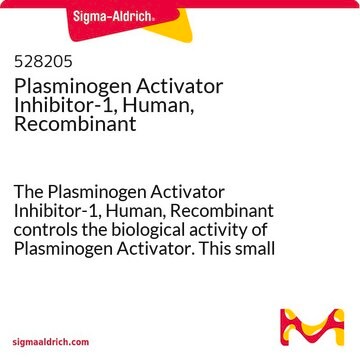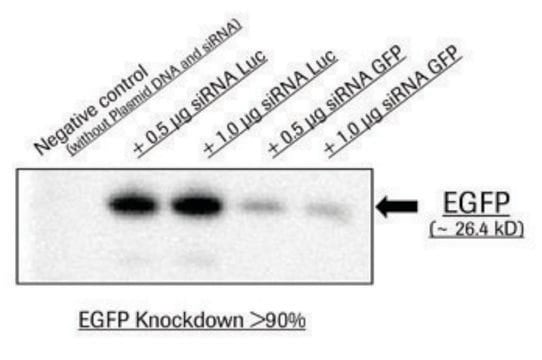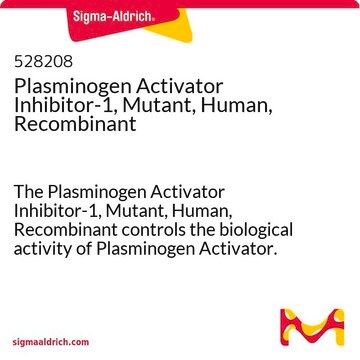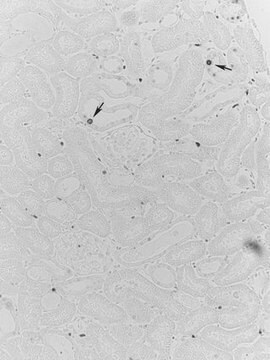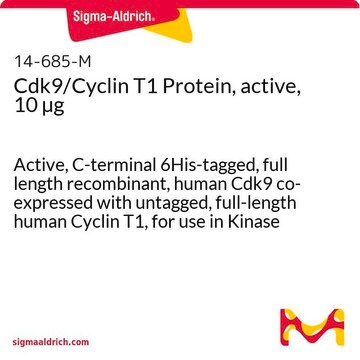おすすめの製品
詳細
Plasminogen activator inhibitor-1 (PAI-1) is a member of the serine protease inhibitor (serpin) superfamily and a central regulatory protein in the blood coagulation system. PAI-1 is unique among serpins in exhibiting distinct active and inactive (latent) conformations in vivo. Human PAI-1 is a single-chain glycoprotein with a molecular weight of 43 kDa. This inhibitor acts as "bait" for tissue-type and urokinase-type plasminogen activators (tPA and uPA) and protein C. Its rapid interaction with tPA may function as a major control point in the regulation of fibrinolysis. The highly mobile reactive-center loop (RCL) is thought to account for both the rapid inhibiton of plasminogen activators, and the rapid and spontaneous transition of the unstable, active form of PAI-1 into the stable, inactive conformation (t1/2 at 37oC, 2 hours). The inactive form can be partially reactivated by denaturants such as urea, guanidine hydrochloride or SDS. High concentrations of PAI-1 have been associated with human thromboembolic disease. PAI-1 activity may limit the extent of tumor metastasis, since uPA activity is a major contributory factor promoting dissolution of tumor matrix and basement membrane.
The sequence corresponding to amino acids 24 to 402 of human PAI-1 (mature form) tagged with 6xHis on the carboxy-terminal was expressed in E. Coli.
アプリケーション
To fully activate the latent PAI-1, the PAI-1 must be incubated in Activation Buffer (2X Activation Buffer: 8 M Guanidine HCl, 40 mM Sodium Acetate, pH 5.6, 400 mM NaCl, 0.2% Tween 20) for 15 to 30 minutes (Sancho, 1994).The recombinant PAI-1 is able to bind to uPA resulting in a SDS-stable complex.
物理的形状
Liquid. In 150 mM Na2HPO4, pH 6.6, 500 mM NaCl, 2 mM Glutathione, and 0.01% Tween-80.
保管および安定性
Store at -80ºC. Thaw on ice and freeze aliquots at -80ºC for longer storage. This product is stable for at least 2 years as supplied. Avoid repeated freeze/thaw cycles.
アナリシスノート
Specific Activity: By uPA activity assay, the recombinant PAI-1 contains a mixture of the active and latent forms, with >45% of active form
法的情報
CHEMICON is a registered trademark of Merck KGaA, Darmstadt, Germany
免責事項
Unless otherwise stated in our catalog or other company documentation accompanying the product(s), our products are intended for research use only and are not to be used for any other purpose, which includes but is not limited to, unauthorized commercial uses, in vitro diagnostic uses, ex vivo or in vivo therapeutic uses or any type of consumption or application to humans or animals.
保管分類コード
10 - Combustible liquids
WGK
WGK 2
引火点(°F)
Not applicable
引火点(℃)
Not applicable
適用法令
試験研究用途を考慮した関連法令を主に挙げております。化学物質以外については、一部の情報のみ提供しています。 製品を安全かつ合法的に使用することは、使用者の義務です。最新情報により修正される場合があります。WEBの反映には時間を要することがあるため、適宜SDSをご参照ください。
Jan Code
CC4075:
試験成績書(COA)
製品のロット番号・バッチ番号を入力して、試験成績書(COA) を検索できます。ロット番号・バッチ番号は、製品ラベルに「Lot」または「Batch」に続いて記載されています。
Immunocytoprotection after reperfusion with Kv1.3 inhibitors has an extended treatment window for ischemic stroke.
Lee, et al.
Frontiers in Pharmacology, 14, 1190476-1190476 (2023)
P M Sherman et al.
The Journal of biological chemistry, 267(11), 7588-7595 (1992-04-15)
Plasminogen activator inhibitor-1 (PAI-1) is a specific inhibitor of the serine proteases tissue-type plasminogen activator (tPA) and urokinase-type plasminogen activator (uPA). To systematically investigate the roles of the reactive center P1 and P1' residues in PAI-1 function, saturation mutagenesis was
Ruth D Lee et al.
Translational stroke research (2023-04-24)
Senicapoc, a small molecule inhibitor of the calcium-activated potassium channel KCa3.1, was safe and well-tolerated in clinical trials for sickle cell anemia. We previously reported proof-of-concept data suggesting that both pharmacological inhibition and genetic deletion of KCa3.1 reduces infarction and
Victor Garcia et al.
Proceedings of the National Academy of Sciences of the United States of America, 117(17), 9497-9507 (2020-04-18)
Nitric oxide (NO) produced by endothelial nitric oxide synthase (eNOS) is a critical mediator of vascular function. eNOS is tightly regulated at various levels, including transcription, co- and posttranslational modifications, and by various protein-protein interactions. Using stable isotope labeling with
ライフサイエンス、有機合成、材料科学、クロマトグラフィー、分析など、あらゆる分野の研究に経験のあるメンバーがおります。.
製品に関するお問い合わせはこちら(テクニカルサービス)
